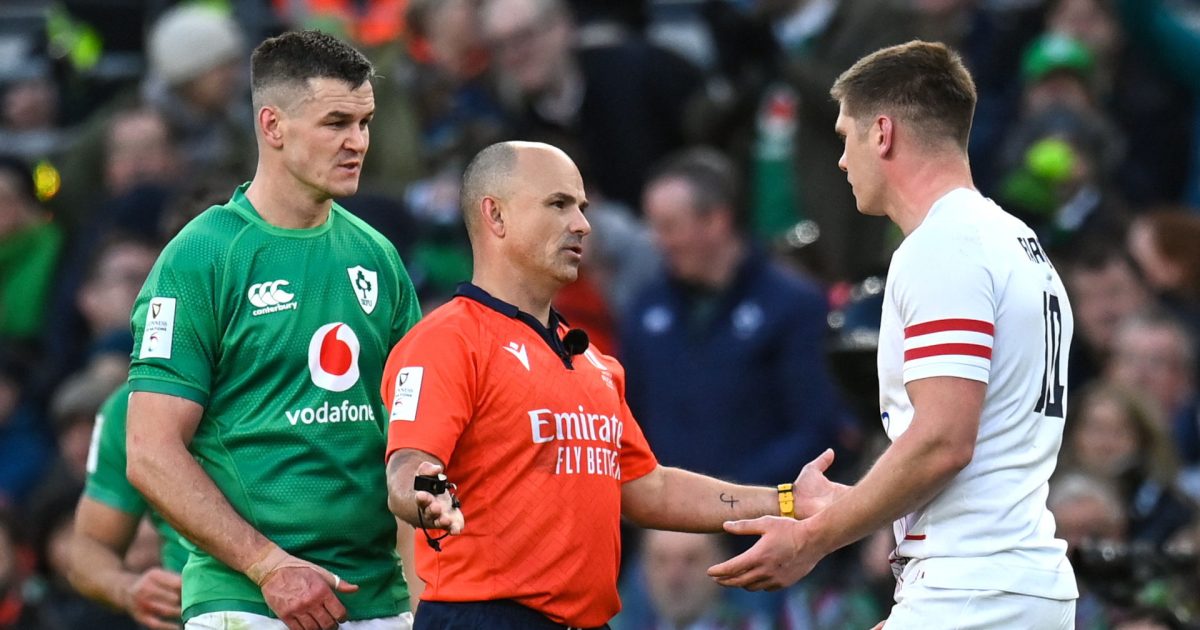We should prepare ourselves for more diving in rugby

Around 20 years ago two Warwickshire club sides were about an hour into an uneventful match.
The visitors won a defensive scrum about ten metres from their own line and with plenty of time their scrum half passed to his full back who waited deep in the in-goal area.
The visiting no.15 duly cleared his lines and found a good touch – then a split second later as the home flanker who had got nowhere near making a charge-down passed about a metre to his left he threw himself theatrically to the ground and screamed loudly.
The flanker was momentarily frozen to the spot, then realisation hit him.
“What the **** are you doing?” he berated his prone opponent.
All the other players quickly turned to look then one by one everyone – including the full back’s teammates – began to laugh. He duly went a deep shade of red, clambered up, muttered an apology and the game continued.
A couple of hours later we were all a few pints under when the home side’s flanker approached the referee in the bar.
“Did you think about giving him a yellow card for diving ref,” he asked. I had to confess like everyone else I had been too busy laughing to even consider it.
I was reminded of this almost-forgotten incident this weekend when watching first France’s Damian Penaud then Ireland’s Grand Slam winning captain Johnny Sexton milk similar incidents for all they were worth.
Penaud stayed on the Stade de France turf for a good 90 seconds after being shoved out of the way by an off-balance opponent before eventually realising that referee Nic Berry was not remotely interested in how he got there.

And in Dublin Sexton feigned a head injury after being shoved in the back by England no.8 Alex Dombrandt. Alive to what was afoot, England skipper Owen Farrell then suggested to referee Jaco Peyper that since his opposite number thought he’d sustained a head injury he also should leave the pitch for an HIA. Unsurprisingly this brought the whole sorry episode to an abrupt end.
I have never been very comfortable with the ingrained snobbery with which many rugby fans look down upon their football counterparts. This whole ‘we know how to behave in rugby’ thing along with the ‘thugs game played by gentlemen’ line has always to me overlooked huge historic and cultural differences which exist between the two sports – certainly in England and I suspect also elsewhere in the world.
But despite this few would dispute that the pre-1995 amateur version of rugby union in this respect had some marked differences to its round-ball counterpart or that in leaning heavily on the so-called ‘spirit of rugby’ and ‘rugby values’ our sport’s governing bodies have tried to cling on to that essence in the professional age.
But in the same way that calling the referee ‘sir’ and accepting without question his law book defined status as the sole judge of fact and law has gradually become a relic of the past, does the arrival of diving/simulation represent the removal of another layer of rugby’s traditional values?
Speaking to host Jim Hamilton on his podcast ‘The Big Jim Show,’ Saracens’ England no.8 Billy Vunipola described what happened next after he took a blow to the head in the Premiership final against Leicester.
He said: “I stayed down too long because I thought ‘we’re going to get a yellow card here so let’s have a rest.’
“I remember our doctor Laura holding my head and I was saying: ‘Get off me Laura I’m fine I’m just trying to milk a penalty’ and the next thing I knew I was in the medical room with the independent doctor which was my own fault.”
Every action generates a reaction and the knock-on effect of this approach was evident during this season’s Six Nations meeting between France and Scotland.
Noting that the home side had sent on a doctor to examine the injured Anthony Jelonch, referee Nika Amashukeli clearly suspected that the hosts were without good cause trying to delay the game for long enough that the TMO would examine the hit which caused the injury.
His curt instruction to the medic was therefore: “Tell me it’s a HIA and leave the pitch with the player or leave the pitch immediately.”
As events transpired France’s bench clearly knew what had gone on better than the referee and one review later Scotland lock Grant Gilchrist was heading for an early bath.
Having yesterday seen clips of England’s Lewis Ludlam being the victim of a head contact as an Irish player flew into a maul during Saturday’s contest in Dublin, it is hard not to wonder what would have happened had the arrival of a doctor again triggered a pause.
At the root of all this is the introduction of first red and yellow cards in the late 1990’s then the arrival of the TMO and citing commissioner.
I recall as a teenager avidly reading all the Sunday newspaper coverage of Wales flanker Paul Ringer’s sending off during England’s 1980 Grand Slam season following a very late and high tackle on John Horton.
In those days a sending off was the rarest of commodities but as we saw with the resigned reaction to Freddie Steward’s dismissal at the Aviva Stadium, following the introduction of safety-based changes they are now commonplace.
With it being so much easier to get a red card – even for an unintentional act – unfortunately it is inevitable in the dog-eat-dog world of professional sport that players and coaches will seek to take the opportunity to reduce their opponents’ numbers whenever an opportunity presents itself. After all, how often does a team that plays with 14 players for a prolonged period manage to win?
At the risk of turning this column into a trip down memory lane, I recall watching football on TV in the 1980’s and when being asked to comment on a British player staying down following a foul, pundits would often say: “One professional would never try to get another sent off.”
While this rule of thumb didn’t apply elsewhere in the world, when we occasionally saw an Italian or Spanish side in the European Cup we would all enjoy the ridicule heaped upon their theatrics.
Forty years later, diving is now such an accepted part of football in every corner of the globe that a yellow card may be shown for simulation. Might rugby union be heading in the same direction?
An alternative angle on this is that only the presence of the TMO puts rugby in this position. I have covered around a dozen games this season in the English Championship and National One at Coventry and Birmingham Moseley and struggle to recall any penalties being awarded for dangerous play relating to head contact while the only diving done is from the bar at the end of a long evening.
Does this therefore add further fuel to those who believe we need separate versions of the law book for the professional game and the rest of us?
Food for thought…
































































A few years ago, watching a Scotland international, Stuart Hogg collected a long kick from the opposition and then played the customary return kick. As a did, an opponent was closing in to try and charge it down but was nowhere near close enough to reach it, or Hogg, However, as the opponent trotted past him (but nowhere near making contact) Hogg decided to throw himself to the ground and hold his leg. By the this time, the ref, Nigel Owens had made it the vicinity and simply ran past, turned to Hogg and simply said, "I saw what you did and don't like it, don't do it again"
I remember that incident well. Nigel Owens was always one of the best at sussing out those kinds of theatrical actions and was very rarely deceived by them. It is a shame rugby is going down the path of football in this respect but as the author states it is an inevitable consequence of the new HIA protocol and the laws designed to prevent head contact. Automatic yellow cards for simulation as in soccer seem to be the only reasonable solution to the problem imho
If the game of rugby continues to go the way of football, it will have to prepare itself to see it's fans fall out of love with the game of rugby. I can't watch football because of the theatrics of diving to win a foul, I won't watch rugby for the same reasons. I'll use my RWC 2023 tickets as I bought them a long time ago but, I am falling out of love with the game.
I don't think it's quite that dire but it does feel at the moment that there's a real move to attract new fans and not much effort to keep the fans that are there already.
Sexton has been doing this for several years now and refs buy it all the time because it's Sexton. Farrell was brilliant on Saturday because when Sexton has feigned these head knocks to get penalties and yellow cards (Liam Williams this year), he has never been taken off for a HIA! If Williams' challenge was deemed worthy of a yellow card, that means definite head contact and a degree of danger, yet Sexton stayed on. Ireland have perfected the dive in recent years, especially with the addition of Lowe and Hansen, who, not being Irish or from the Northern Hemisphere, have brought their style of rugby and it is not welcome!!
Amusingly, in the Sarries v Quins game at the weekend it was Farrell who dived, throwing his hands up in the air and the clutching his face after an arm made contact with his neck… Farrell also didn’t go off for an HIA, despite a yellow card being issued…
I've been of that opinion for a while now. Any player who stays on the turf for longer than a couple of seconds following contact or is seen to be holding their head etc must automatically be sent for an HIA whether replays show evidence of an impact or not. Not only would this prevent players from continuing playing following a blow to the head which might have been missed by the cameras, but it would go a long way towards stamping out such disgraceful play acting. It would be interesting to see how well received such actions would be by a player's team mates when they have to pick up the defensive slack in the 75th minute due to their dishonesty and lack of integrity
Agree with your post on Sexton. He is used to this, well done Farell